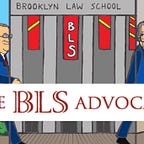ACLU v. Federalist Society: Drone Strikes
On Monday November 12, the Brooklyn Law School Federalist Society and Brooklyn Law School ACLU co-sponsored a debate addressing the targeted killings of American citizens in the “War on Terror.” Professor Susan Herman, Centennial Professor of Law and President of the American Civil Liberties Union represented the BLS ACLU. Professor Michael Lewis, former Navy pilot and Professor of Law at Claude W. Petit College of Law at Ohio Northern University, represented the Federalist Society.
Professors Herman and Lewis addressed the merits of al-Aluaqi v. Panetta (ACLU, March 2012) as well as broader policy concerns about the use of targeted drone strikes in the “War on Terror” and against American citizens in particular. The al-Alauqi suit challenged the killing of three American citizens in Yemen with ties to al-Qaeda, including the prominent al-Qaeda operative Anwar al-Alauqi and his son. Al-Alauqi has alleged ties to the September 11 hijackers, the Fort Hood shooter, and the foiled 2009 “Underwear Bomber” attack on Detroit.
Professor Herman began by explaining the issues raised in the ACLU lawsuit and its connection to a related lawsuit seeking broader disclosure of information regarding the operation of the American drone strike program. She explained that the ACLU’s position was that the Constitutional rights of al-Aluaqi and others had been violated by the series of drone strikes at issue in the suit.
She argued that there were serious Due Process and Fourth Amendment concerns that needed to be taken into account, and also raised the possibility that the strikes violated the Constitution’s Bill of Attainder Clause. The legality of the strikes, she explained, hinged on whether or not these individuals were properly determined to have been in an area of armed conflict. If not, then their deaths should be deemed assassinations, which are illegal under U.S. and international law. She argued that unlike Iraq and Afghanistan, the United States was not involved in a war with or within Yemen and that this raised serious concerns about the geographical limits of the American drone strike program.
Professor Herman also raised broader policy concerns. Citing the Bureau of Investigative Journalism, Herman claims that there have been about 7,000 strikes resulting in 3,000 deaths, of which 150 were children. The Bureau also says that only about 2% of those killed by drones have been high-value targets. She also argued that drone strikes serve as a recruiting tool for extremist organizations.
Professor Lewis argued in response that the strikes were legal under both U.S. domestic law and International Humanitarian Law (IHL). As a constitutional matter, he argued that American citizens who take up arms as enemy combatants against the United States are not afforded constitutional protections and may be treated like any other enemy combatant according to the laws of war. He cited the Supreme Court decision in Ex Parte Quirin, which validated the use of military tribunals and the execution of American citizens who served as Nazi saboteurs during WWII. Importantly, he noted, Congress has authorized the use of force against al-Qaeda and related groups following the September 11 attacks.
As far as IHL was implicated, he argued that although members of al-Qaeda and related groups do not qualify as enemy combatants (because they do not internally enforce international laws of war), they can be considered direct participants in hostility (DPH) and are not civilians under IHL. Further, DPH’s can clearly be targeted if they are involved in a “continuous combat function” against the United States. This includes include terrorist leaders and operatives. He cautioned against precisely defining the point at which an individual loses his DPH status and is afforded civilian protection, citing concerns that al-Qaeda would then use these guidelines as a roadmap to avoiding being targeted.
Addressing the apparent lack of geographic limitations on the American drone strike program, Professor Lewis argued that under international customary law, it was legal for the United States to employ drone strikes in countries which provide consent or which are otherwise unable or unwilling to meet their obligations to expel organized, armed groups. These strikes are limited to DPHs. To insist on strict geographical limits, he argued, based upon the presence or absence of an armed conflict, would provide havens for al-Qaeda to plan attacks and avoid targeting.
Further, he argued that the current drone strike program is less costly and inflicts less collateral damage then next-best alternatives such as ground operations. Finally, he stated that more recent studies cast doubt on the Bureau of Investigative Journalism report cited by Professor Herman.
Adam Ludemann also contributed to this article.
